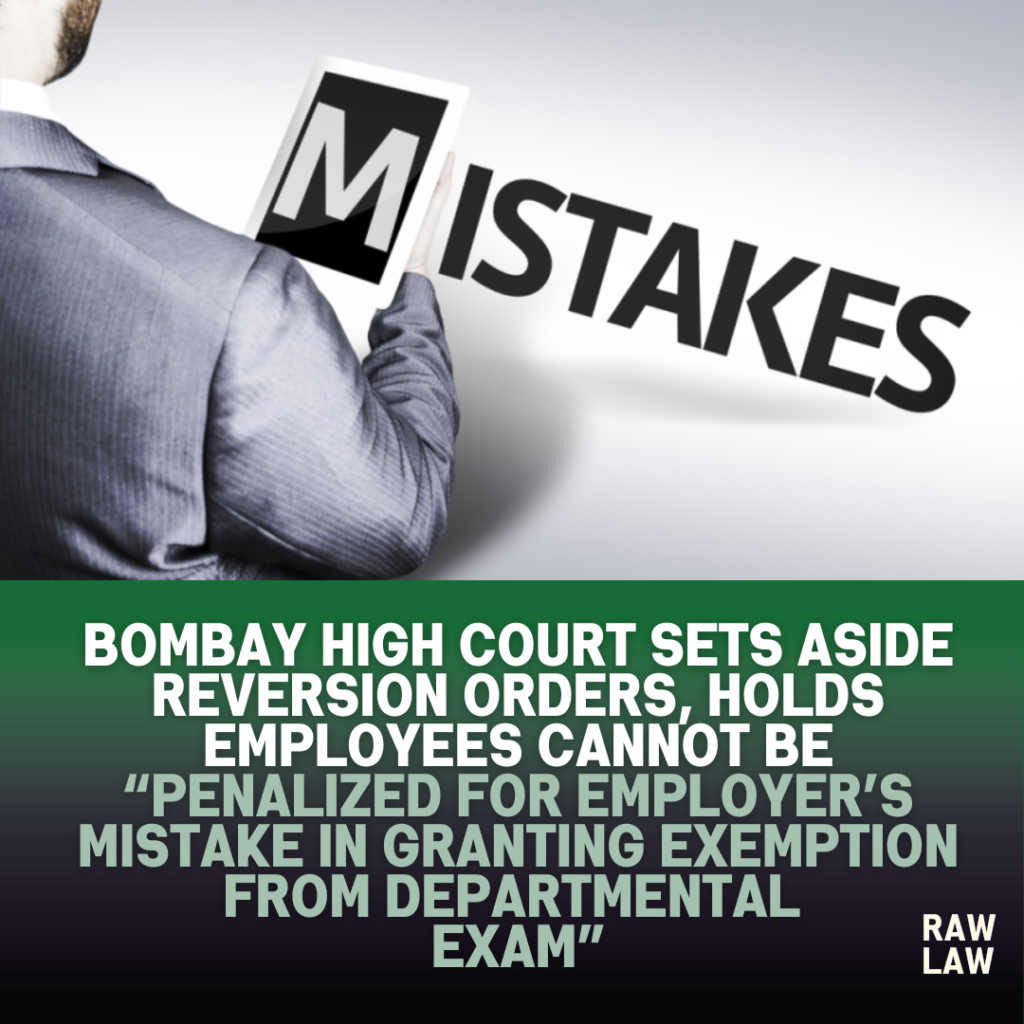“It would be unjust, unreasonable and harsh to conclude that the Petitioners should be penalized for the default/mistake by MJP.” — Bombay High Court
Court’s Decision
The Bombay High Court allowed both writ petitions, holding that the petitioners—retired Executive Engineers—could not be faulted for an error committed by the Maharashtra Jeevan Pradhikaran (MJP) in wrongly granting them exemption from the Departmental Professional Examination (DPE) during service. The Court quashed the reversion orders and directed the respondents to treat the petitioners as having been validly promoted. It ordered the restoration of all consequential service and pensionary benefits.
Facts
The petitioners were promoted as Deputy Engineers in 1995 when they were over 40 but under 45 years of age. According to Rule 2 of the Maharashtra Public Works Manual, they were required to clear the DPE in the subject of ‘Accounts’ within three years. However, an erroneous entry in their service records showed that they were fully exempted from the examination, and thus they never took it. Relying on this, both were promoted to Executive Engineers and held those posts until their superannuation in 2008 and 2010 respectively. In 2007, the MJP issued a circular cancelling such exemptions, and in 2011, orders were passed reverting them to Deputy Engineer positions after their retirement. Aggrieved, the petitioners approached the High Court in 2014.
Issues
- Whether the petitioners were required to pass the DPE in the subject of ‘Accounts’ at the time of their promotion.
- Whether the MJP’s cancellation of the exemption 14 years later could legally justify reversing promotions and altering pensionary benefits post-retirement.
Petitioner’s Arguments
The petitioners contended that:
- The exemptions were granted in 1997, and cancellation was effected only in 2011—after their retirement.
- They never sought to manipulate the exemption and relied in good faith on official entries in their service records.
- Penalizing them after superannuation for an error committed by the employer was unjust and violative of principles of fairness.
- The delay in issuing the reversion orders made them unsustainable.
Respondent’s Arguments
The respondents argued that:
- The petitioners were in the 40–45 years age bracket at the time of promotion and were required to clear the DPE (specifically in ‘Accounts’) as per the applicable rules.
- The exemption recorded in their service books was erroneous and contrary to the Rules.
- The exemption was rightly cancelled by the 2007 circular and consequential reversion orders were valid and enforceable.
Analysis of the Law
The Court analyzed Rule 2 of the Maharashtra Public Works Manual, which requires candidates between 40 and 45 years of age to pass the DPE in ‘Accounts’. It acknowledged that the exemption was mistakenly granted, and service records were wrongly updated. However, it stressed that no fault lay with the petitioners and they had acted in accordance with official communications. The Court also noted that the error went uncorrected for 14 years and was only acted upon after the petitioners retired.
Precedent Analysis
The Court relied on the following precedents:
- State of Maharashtra v. Jagannath Achyut Karandikar, 1989 Supp (1) SCC 393
- Held that undue delay in correcting a mistake should not penalize an employee, especially post-retirement.
- Applied here to emphasize that the reversion orders passed after retirement are not sustainable.
- Sandesh Gajmal Shinde v. Nashik Municipal Corporation, 2017 (4) Mh.L.J. 220
- Supported the principle that service-related corrections must be made in a timely manner and not after retirement.
Court’s Reasoning
The Court held that although the petitioners technically should have passed the DPE in ‘Accounts’, they relied on official records stating otherwise. It observed that no evidence of manipulation or wrongdoing on their part was presented. The lapse was entirely attributable to the MJP’s administrative failure. The reversion orders, issued after retirement, were therefore arbitrary and unjustified.
“Had this error been noticed within a reasonable time… the Petitioners could have been granted an opportunity to appear for the Accounts examination.”
Conclusion
The Court allowed both writ petitions and quashed the reversion orders and all consequential actions. It directed the respondents to:
- Treat the petitioners as having been validly promoted to Executive Engineers.
- Release all salary arrears, pensionary benefits, and increments that were withdrawn.
- Complete these actions within two months from the date of the judgment.
Implications
This judgment reaffirms the principle that employees cannot be penalized post-retirement for administrative errors made by the employer. It emphasizes that service rules must be applied justly, and delays in corrective action undermine the fairness of administrative decisions. The ruling safeguards pensionary entitlements and promotions of retired public servants where no misconduct is attributable to them.
Cases Referred and Their Relevance
- State of Maharashtra v. Jagannath Achyut Karandikar
Cited to support the principle that administrative errors should not result in punitive actions after retirement. - Sandesh Gajmal Shinde v. Nashik Municipal Corporation
Cited to highlight that delayed correction of administrative errors cannot be the basis for recovery or reversion post-retirement.
FAQs
1. Can a government employee be reverted post-retirement due to errors in exemption from exams?
No. The Bombay High Court held that post-retirement reversion is unjust when the exemption was granted by mistake and not due to any misrepresentation by the employee.
2. Are employees required to pass Departmental Exams after 40 years of age?
Yes, if they are between 40 and 45 years at the time of promotion, they must pass the DPE in ‘Accounts’ unless expressly exempted.
3. What if the exemption was granted wrongly by the employer?
The Court ruled that the employee cannot be faulted for the employer’s mistake, especially if acted upon in good faith and without manipulation.
